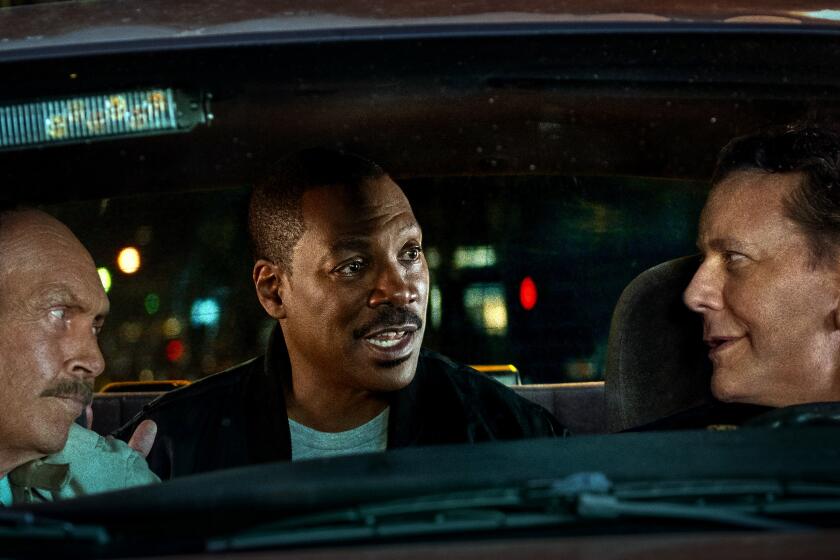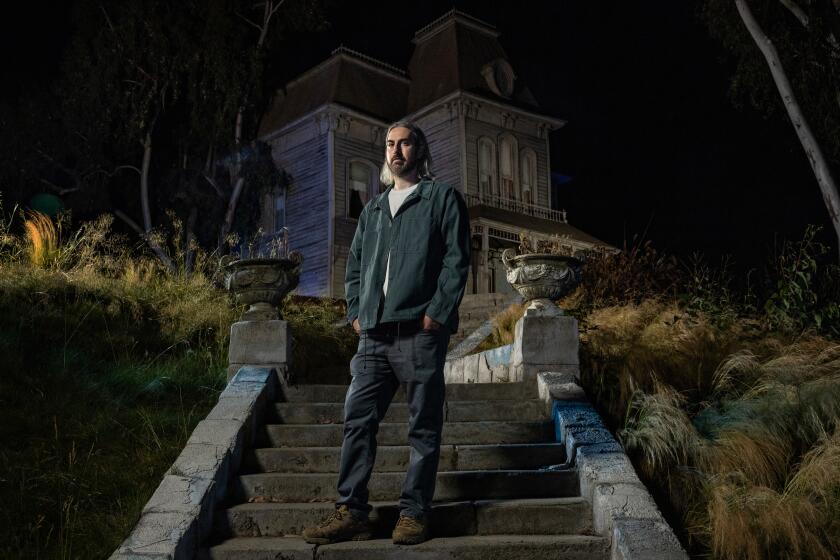Oh, He’s Just Playing With Your Mind
“There was this one critic,” Christopher Nolan says, a smile playing on his face, “who liked my first film, but he seemed a bit disturbed by it.” The smile broadens. “It got him in the back of the mind.” Which was what this gifted young writer-director has in his mind to do.
“When you’re dealing with psychological thrillers, they’re not supposed to be comfortable stories, they’re supposed to be disturbing,” Nolan says. “All the great thrillers had a power that’s almost entirely lost because the elements have become very familiar, very ritualized. I wanted to give the world a sense of menace and blackness, to plant the seed of a not very pleasant view of life and awaken distrust, paranoia, uncertainty.”
With “Memento,” his second feature, Nolan has very much succeeded. The intricate working out of a compelling, despairing premise, “Memento” so impressed festival organizers (perhaps chagrined at letting that first feature, “Following,” escape to Slamdance) that they placed it in the dramatic competition, usually the preserve of world premieres, even though it has had previous festival exposure in Venice, Deauville and Toronto. The film had its Sundance Film Festival premiere over the weekend.
Best described as a thriller told backward, “Memento” begins with the kind of murder that would be the climax of a conventional effort. What the film does then is carefully work its way back to the beginning of the story, in a way that geometrically increases the tension and sense of unease of a more ordinary film.
Part of the reason for that anxiety and apprehension is the unusual, haunting nature of “Memento’s” protagonist, dreamed up by Jonathan Nolan, whose short story (to be published in Esquire in March, the same month the film is due to be released) was the basis of his brother’s film.
Leonard Shelby (expertly played by “L.A. Confidential’s” Guy Pearce) is a former insurance investigator saddled with a peculiar and devastating mental condition: A blow to the head, as he was grappling with the men who raped and murdered his wife, caused him to lose the ability to create short-term memories.
So while Leonard can remember everything up to the blow to the head, he retains anything that happened after for no more than a few minutes. Determined to revenge his wife’s death, Leonard compensates with an elaborate system that includes notes, photographs and, most bizarre of all, key information tattooed on his body so he can read it in a mirror.
As soon as Christopher Nolan heard his brother’s story (inspired by a real condition called auterograde memory loss he’d heard about in college), he decided telling it subjectively, from Leonard’s viewpoint, was the way to go.
“I’ve always been fascinated by point of view and perceptual distortion,” he says. “If you put the audience into this guy’s head, you show them something familiar in a slightly different way. Where a film like ‘Chinatown’ takes a complex plot and gives it the illusion of simplicity, ‘Memento’ takes an incredibly simple story and views it through the eyes of someone for whom it is incredibly complicated.”
Fracturing the narrative, in this case by telling it backward, is another thing that has always interested Nolan. “If you look at ‘Citizen Kane,’ ” he says, “every aspect of the film has advanced except for the structure, which still looks incredibly adventurous.
“I think that film narrative has been held back by television. It comes down to what I call the pizza delivery scenario. If a pizza arrives while you’re watching TV, you have to answer the door, deal with the man and then be able to get straight back into the story, having missed three or four minutes.
“With ‘Memento,’ on the other hand, if you come in three minutes late you miss the whole movie. What I’m proudest of about this film is that though I’ve got a good visual memory and I’ve seen it about a thousand times, if I walk into a screening when the film’s been on for 20 minutes, even I don’t know what scene is coming next.”
Sure to cause talk as well is “Memento’s” unashamedly ambiguous finale. Though Nolan understands that “what audiences want is objective truth, they want the comfortable experience of all the things like conflict and resolution we don’t get in real life, which is more messy,” he felt he couldn’t quite provide that here.
“Certain ambiguities are built into the ending, and not to have that would be to sell out the terms of the story,” he says. “For a film about a man who can’t perceive objective truth, to step outside of his view too far would be a shame.”
An L.A. resident who recently turned 30 and is married to Emma Thomas, the film’s associate producer, Nolan has an interest in questions of identity that stems, perhaps, from his being the child of a British father and an American mother who “spent my whole life trying to be both.”
Nolan was interested in film from an early age, experimenting with his father’s Super 8 camera when he was 7. He spent three years of his childhood in Chicago, where, curiously enough, he made beginning films with his best friends Roko and Adrian Belic, who grew up to make the Oscar-nominated documentary “Genghis Blues.”
Nolan’s first feature, “Following,” also juggles questions of time. Shot in London one day a week for a year on the barest of budgets (counting the cost of making a print to send to festivals, the price was less than $10,000), it was called “the freshest beginner’s feature I’ve seen this year” by top British critic Alexander Walker.
Still, Nolan brought the film here (it was distributed by Zeitgeist) because “to get a film of that size noticed in the British film industry is difficult; everything is very sort of closed. In England, people are always asking ‘Why?’ while Americans ask ‘Why not?’ In England everyone was afraid of wasting their time, while everyone here is afraid of missing something.”
Still, even with a film like that completed, Nolan knew that “Memento” was not business as usual, even for him. “There was a degree of adventure in just writing the script, but paper is pretty cheap. I showed it to friends with a certain amount of trepidation, and to actually film it felt incredibly risky. But as a new filmmaker, I have the luxury of doing that. I really ought to feel that way.”
More to Read
Only good movies
Get the Indie Focus newsletter, Mark Olsen's weekly guide to the world of cinema.
You may occasionally receive promotional content from the Los Angeles Times.






